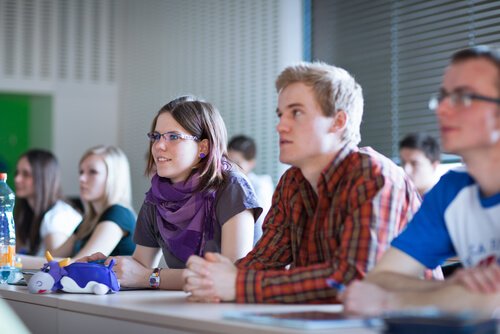What's the Link Between Education and Political Beliefs?

In this article, we’re going to focus on the effects education has on political life. Education obviously involves much more than just the academic world, but that’s a big part to keep in mind. The “political effects” we’re going to look at in this article are: political involvement, political attitude, and political knowledge.
Now we’re going to talk a little bit about those effects through three different lenses. These lenses are: (a) external variables that affect education and political beliefs, (b) direct variables, and (c) indirect variables.
External variables that affect education and political beliefs
On a statistical level, when we talk about external, modulating, or third variables, what we’re talking about is the external thing that creates a link between two variables. For example, there’s a link between the number of hospitals and jails in a city. It’s a statistical fact that cities with more hospitals have more jails. But the link comes from a third variable that affects both of the others: population.
When it comes to education and political beliefs, there are external things that affect both variables, which explains part of the link. There are a lot, but here are the most important ones: cognitive abilities, personality, and socio-economic background.

Cognitive abilities
The link with cognitive abilities is pretty obvious. Having a high level of verbal expression, abstract reasoning skills, and good memory, among other things, will help you get farther in both formal education and your political capacity. On the other hand, cognitive abilities that go against the educational system you develop them in are like a breeding ground for weak political understanding.
Personality
As far as personality goes, the important thing is to understand that certain attitudes can affect education and political beliefs. For example, predispositions towards learning, being curious, and researching have a link to higher academic performance and greater political understanding.
Socio-economic background
Another key aspect is the socio-economic background. This is because both political life and formal education have social restrictions. A lot of people can’t go to college because they just can’t afford it. Along the same lines, people with a lower socio-economic status don’t usually spend much time on politics. Sometimes it’s because they’ve been directly pushed out. But other times it’s because they spend most of their time trying to survive unstable work conditions.
Direct variables in education that affect political beliefs
There’s a huge variety when it comes to formal education. Apparently these different ways of organizing people’s education lead to differences in what we’re calling “political understanding.” This is also proof that the two variables have a direct link. But what are the specific things that affect this link? The most significant ones are curriculum content and educational values.
Curriculum content
Curriculum content can have a direct influence on the political knowledge students gain. For obvious reasons, explicitly teaching political concepts helps create future citizens with much better political analysis skills. On top of that, the kind of content also has a big impact on students’ political leanings. In other words, political education that talks about the benefits of liberalism will probably lead to people who identify more with those ideas.
Educational values
Educating students in values based on dialogue, debate, and critical thinking is essential. It’s the best way to help them develop their own political attitude. There’s a strong link between schools with these principles as their foundation and politically-invested students. But if people receive a close-minded, hierarchical education, they get used to dogma and authority. In the end, those are principles that will always go against a critical attitude towards politics.
Indirect variables between education and political beliefs
There’s a good chance that a person’s level of education will end up determining different parts of their life. There’s usually a big difference between starting your work life after high school and starting it after you finish a Ph.D. A lot of these differences in terms of education also play a part when it comes to people’s political attitudes. Anyway, the most important indirect variables between education and political beliefs are social position, self-image, and opportunities.
Social position
In society’s eyes, your level of education usually puts you “above” some people and “under” others. This happens because our society has a ton of stereotypes that lead us to see people differently based on whether they have or don’t have a lot of education. The basic link here is that the higher your level of education, the more political influence (if other variables are the same) you’ll have.

Self-image
Everything you learn during your academic life also plays a part in how you see yourself. Your self-image will push you towards putting yourself in the same category as other people with a similar level of education. It also happens that the groups of people with higher levels of education are more socially accepted when it comes to politics.
Opportunities
Lastly, a high level of education usually also means having more opportunities. So basically, based on how many opportunities you have, you’ll have more or less chances to do things related to politics.
There are a lot of different perspectives when it comes to the link between education and political beliefs. However, they all give us fundamental information about how to make sure we have politically active, highly competent people in our society. The first thing might be to make sure there are no social or economic restrictions to politics. That way it’s more likely our political systems will be more representative, and that will make it easier to do things for the common good.
This text is provided for informational purposes only and does not replace consultation with a professional. If in doubt, consult your specialist.








